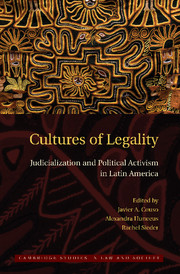Book contents
- Frontmatter
- Contents
- Contributors
- PART I INTRODUCTION
- PART II COURTS AND JUDICIALIZATION THROUGH A CULTURAL LENS
- 2 Legal Language and Social Change during Colombia's Economic Crisis
- 3 How Courts Work: Institutions, Culture, and the Brazilian Supremo Tribunal Federal
- 4 More Power, More Rights? The Supreme Court and Society in Mexico
- 5 Rejecting the Inter-American Court: Judicialization, National Courts, and Regional Human Rights
- PART III JUDICIALIZATION BEYOND THE COURTS
- Index
- CAMBRIDGE STUDIES IN LAW AND SOCIETY
- References
2 - Legal Language and Social Change during Colombia's Economic Crisis
Published online by Cambridge University Press: 20 May 2010
- Frontmatter
- Contents
- Contributors
- PART I INTRODUCTION
- PART II COURTS AND JUDICIALIZATION THROUGH A CULTURAL LENS
- 2 Legal Language and Social Change during Colombia's Economic Crisis
- 3 How Courts Work: Institutions, Culture, and the Brazilian Supremo Tribunal Federal
- 4 More Power, More Rights? The Supreme Court and Society in Mexico
- 5 Rejecting the Inter-American Court: Judicialization, National Courts, and Regional Human Rights
- PART III JUDICIALIZATION BEYOND THE COURTS
- Index
- CAMBRIDGE STUDIES IN LAW AND SOCIETY
- References
Summary
INTRODUCTION
This chapter addresses the interaction between changes in the language of subsistence rights and the possibilities for greater social inclusion during the economic crisis of the late 1990s in Colombia. One would expect that during economic crises, courts would be deferential to governmental policies and manipulate legal language to serve governmental interests. In such situations, courts would be likely to use the rhetoric of political discretion, sovereignty, and the general interest to legitimize unpopular policies of economic adjustment that cut social spending to appease any popular mobilization against them.
In contrast with this assumption, the evolution of social rights' adjudication before and throughout the Colombian crisis suggests that the function of legal language is not just to legitimize adjustment policies. The language of the courts need not be an epiphenomenon of power politics. In fact, this language can be contested, transformed, mobilized, and used to foster an explosion in litigation that ultimately contributes to activating the political process, even against the explicit interests of the government. However, the case of Colombia also suggests that during times of crisis, and contrary to what some scholars assume, the successful contestation of legal meanings can help to reproduce the status quo instead of producing social change. Because the language of rights is general and abstract, it prevents courts from distinguishing between different people and different types of threats to people's material subsistence.
- Type
- Chapter
- Information
- Cultures of LegalityJudicialization and Political Activism in Latin America, pp. 25 - 50Publisher: Cambridge University PressPrint publication year: 2010
References
- 8
- Cited by



